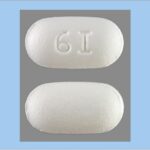Bofen (Ibuprofen): Uses, Dosage, Side Effects, Warnings

Bofen is a popular eastern European name-brand version of ibuprofen, produced by Ukrainian pharmaceutical company PJSC SIC “Borshchahivskiy CPP”. Bofen belongs to a group of drugs called nonsteroidal anti-inflammatory drugs (NSAIDs). These drugs temporarily reduce the amount of prostaglandins made by your body.
Your body releases prostaglandins when you have an injury. These hormone-like substances contribute to inflammation, which includes swelling, fever, and increased sensitivity to pain.
Bofen is used to treat a number of conditions including:
- mild to moderate pain
- severe pain (when combined with codeine)
- fever
- swollen, red, and tender tissues (inflammation)
- rheumatoid arthritis, back pain, and gout (in conjunction with physiotherapy).
Some people use Bofen to get high, or as an act of self-harm by intentionally taking more than the recommended dose.
How should I take Bofen?
Each 5 ml of Bofen oral suspension contains 100 mg ibuprofen. Use Bofen exactly as directed on the label, or as prescribed by your doctor. Use the lowest dose that is effective in treating your condition.
A Bofen overdose can damage your stomach or intestines. The maximum amount of Bofen for adults is 800 milligrams per dose or 3200 mg per day (4 maximum doses).
A child’s dose is based on the age and weight of the child. Carefully follow the dosing instructions provided with children’s Bofen for the age and weight of your child. Ask a doctor or pharmacist if you have questions.
Take Bofen with food or milk to lessen stomach upset. Shake the oral suspension (liquid) before you measure a dose. Use the dosing syringe provided, or use a medicine dose-measuring device (not a kitchen spoon).
You must chew the chewable tablet before you swallow it. Store at room temperature away from moisture and heat. Do not allow the liquid medicine to freeze.
Who should not use Bofen?
Bofen is not suitable for people who have previously had an allergic reaction to aspirin or other NSAIDs or who have just had or are going to have heart surgery.
It may also not be appropriate for those who:
• have repeated stomach problems, such as heartburn or abdominal pain
• have stomach ulcers
• have bleeding problems
• have high blood pressure
• have heart disease
• have kidney disease
• are aged over 60 years
• have taken a diuretic
• are using other NSAIDs or pain relief medication
• are using anticoagulants
• are receiving treatment for any serious condition
• have chickenpox or shingles
• have Crohn’s disease or ulcerative colitis
• have liver problems
People who are already using any type of medication should ask a healthcare professional for advice before taking Bofen.
In 2015, the Food and Drug Administration (FDA) strengthened its warning about the increased risk of heart attack or stroke when using Bofen.
Side effects can arise within the first weeks of using this drug. The risk may be greater with a higher dose or long-term use or if a person has a history of heart disease.
The FDA calls on people to be aware of this possible problem and to seek immediate medical attention if they experience chest pain, difficulty breathing, sudden weakness in one part or side of the body, or sudden slurred speech.
A person should consult a doctor or qualified pharmacist if they are unsure about whether to use Bofen.
When to stop using it
People should stop using Bofen and contact a doctor if they experience:
• faintness or blood in vomit or stool
• pain that gets worse or lasts longer than 10 days
• a fever that worsens or lasts longer than 3 days
• swelling or change in skin color in the area of pain
• any new symptoms
Allergic reactions
Some people may have an allergy to the ingredients of Bofen.
Allergic symptoms include:
• hives, change in skin color, blistering, or a rash
• facial swelling
• wheezing and difficulty breathing
• shock
Anyone experiencing these symptoms should stop using the drug.
In severe cases, anaphylactic shock may occur, and a person will have difficulty breathing. This is a life-threatening situation and requires immediate medical attention.
What are the possible side effects of Bofen?
Bofen medicine may cause other unwanted effects. Although not all of these side effects may occur, if they do occur they may need medical attention.
Check with your doctor immediately if any of the following side effects occur:
More common
- Abdominal pain
- acid or sour stomach
- belching
- bloating
- cloudy urine
- decrease in amount of urine
- decrease in urine output or decrease in urine-concentrating ability
- diarrhea
- difficulty having a bowel movement (stool)
- excess air or gas in stomach or intestines
- full feeling
- heartburn
- indigestion
- itching skin
- pain or discomfort in chest, upper stomach, or throat
- pale skin
- passing gas
- nausea
- noisy, rattling breathing
- rash with flat lesions or small raised lesions on the skin
- shortness of breath
- swelling of face, fingers, hands, feet, lower legs, or ankles
- troubled breathing at rest
- troubled breathing with exertion
- unusual bleeding or bruising
- unusual tiredness or weakness
- vomiting
- weight gain
Less common
- Abdominal cramps
- stomach soreness or discomfort
Rare
- Agitation
- back, leg, or stomach pains
- bleeding gums
- blistering, peeling, loosening of skin
- blood in urine or stools
- bloody, black, or tarry stools
- blurred vision
- burning feeling in chest or stomach
- change in vision
- chest pain
- chills
- clay-colored stools
- coma
- confusion
- constipation
- cough or hoarseness
- dark urine
- decreased urine output
- depression
- difficulty breathing
- difficulty swallowing
- dilated neck veins
- dizziness
- dry mouth
- extreme fatigue
- fast, irregular, pounding, or racing heartbeat or pulse
- fever with or without chills
- frequent urination
- general body swelling
- general feeling of tiredness or weakness
- hair loss, thinning of hair
- headache
- hives or welts
- hostility
- impaired vision
- increased blood pressure
- increased volume of pale, dilute urine
- irregular breathing
- irritability
- itching
- joint or muscle pain
- lab results that show problems with liver
- lethargy
- light-colored stools
- loss of appetite
- lower back or side pain
- muscle twitching
- nosebleeds
- painful or difficult urination
- pains in stomach, side, or abdomen, possibly radiating to the back
- pinpoint red spots on skin
- puffiness or swelling of the eyelids or around the eyes, face, lips, or tongue
- rash
- red skin lesions, often with a purple center
- red, irritated eyes
- redness of skin
- seizures
- severe abdominal pain, cramping, burning
- severe and continuing nausea
- sore throat
- sores, ulcers, or white spots in mouth or on lips
- stiff neck or back
- stomach upset
- stupor
- swollen or painful glands
- tenderness in stomach area
- thirst
- tightness in chest
- unpleasant breath odor
- upper right abdominal pain
- vomiting of blood
- vomiting of material that looks like coffee grounds
- wheezing
- yellow eyes and skin
Symptoms of overdose
- Bluish lips or skin
- difficulty sleeping
- disorientation
- dizziness, faintness, or lightheadedness when getting up from a lying or sitting position suddenly
- drowsiness to profound coma
- hallucination
- lightheadedness or fainting
- mood or other mental changes
- muscle tremors
- not breathing
- rapid, deep breathing
- restlessness
- slow or irregular heartbeat
- stomach cramps
- sudden fainting
- sweating
Some side effects of Bofen may occur that usually do not need medical attention. These side effects may go away during treatment as your body adjusts to the medicine. Also, your health care professional may be able to tell you about ways to prevent or reduce some of these side effects. Check with your health care professional if any of the following side effects continue or are bothersome or if you have any questions about them:
More common
- Continuing ringing or buzzing or other unexplained noise in ears
- hearing loss
- nervousness
Rare
- Crying
- depersonalization
- discouragement
- dry eyes
- dysphoria
- euphoria
- feeling sad or empty
- lack of appetite
- loss of interest or pleasure
- mental depression
- paranoia
- quick to react or overreact
- rapidly changing moods
- runny nose
- sleepiness or unusual drowsiness
- sleeplessness
- sneezing
- stuffy nose
- trouble concentrating
- trouble sleeping
- unable to sleep
Other side effects not listed may also occur in some patients. If you notice any other effects, check with your healthcare professional.
Call your doctor for medical advice about side effects. You may report side effects to the FDA at 1-800-FDA-1088.
What are the long-term effects of using Bofen?
It’s best to discuss the side effects of long-term use with a medical practitioner. Regular use of bofen may eventually cause:
- anaemia due to bleeding in the stomach
- impaired hearing
- kidney and liver damage
- bleeding in the stomach and bowels
- increased risk of heart attack.
What other drugs will interact with Bofen?
Other NSAIDS: More than 900 OTC and prescription medicines contain an NSAID. Taking Bofen when there is frequent chronic use of other NSAIDs can increase the risk of serious side effects, including GI bleeding and cardiovascular problems2.
Anticoagulants/Antiplatelet Medications: Co-administration of NSAIDs like Bofen and anticoagulants can increase the risk of GI bleeding. Antiplatelet medications have GI bleeding risks, which may be compounded by the use of NSAIDs such as ibuprofen.
Corticosteroid Use: The chance of severe stomach bleeding is higher when corticosteroid drugs are used with NSAIDs, including Bofen. This may be due to steroids decreasing the production of protective gastric mucus and delayed healing of NSAID-induced erosions.
Antihypertensive Agents: Ibuprofen and other NSAIDs may be associated with modest increases in blood pressure. NSAIDs like Bofen may blunt the effects of common classes of antihypertensive medications, including diuretics.





